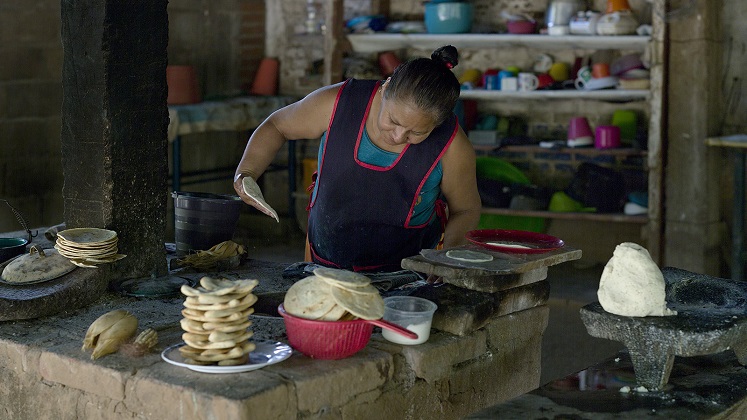The pandemic has brought to the surface a reality that feminists have highlighted for decades: paid and unpaid care work is essential to support economies and societies. Today, the region has the chance to seize the opportunity and strengthen care policies, writes Belén Villegas Plá (University of York)
Lee este artículo en español
In recent decades, feminist movements have become increasingly relevant in Latin American politics, highlighting the importance of addressing gender-based violence, sexual and reproductive health, and the sexual division of labour, among many other gender-based issues. Some of these topics have gained traction in the region’s agenda, especially after the crisis triggered by the covid-19 pandemic.
This is precisely the case of the so-called care policies, which currently occupy a central place in the reform of Latin American protection systems; which has been traditionally weak and precarious. What are care policies? What is their importance in the feminist agenda? And what are the challenges that countries will have to face to enforce this type of policy?
Crisis and making visible the care economy
The social, economic and health crisis triggered by the pandemic has had a global impact, but its effects have been particularly noticeable in the developing world. One of the most affected sectors has been the care economy, which comprises all the unpaid work performed in a household as well as care work that is performed in a paid manner in the labour market. Paid care work includes public and/or private services provided precisely for the care of the population in a situation of permanent or transitory dependency. For example, care and education centres for early childhood, the elderly, and people with disabilities. Likewise, unpaid care work includes a wide range of tasks, including household maintenance, food preparation, educational and companionship tasks, among other activities that some people cannot perform without the help of another person.
As feminists have insisted for many years, paid and unpaid care work is essential to sustain the market and society In Latin America, women still spend over three times on unpaid domestic and care work than men. Therefore, when social services such as health, child education, and care services are not provided, women have to face them by increasing the time they spend on unpaid work.
This is a problem pointed out by feminists for a long time but it was the pandemic that gave the great impetus to this agenda. The several lockdowns and curfews markedly increased the burden of care work in households, especially by women. Soon, the importance of caring for the dependent population became more visible than ever. This opened a window of political opportunity to make societies and governments aware of the central role of these tasks and the unjust sexual division of labour on which they are based.
Therefore, the pandemic catalyzed that feminist discourse that for several decades has emphasized the need to build care policies as a central axis of fairer and more egalitarian societies. Care policies are measures that States take in order to generate gender co-responsibility in care, as well as social co-responsibility between the State, families and the market. In other words, the objective of care policies is to recognize, revalue and redistribute care work between men and women and between the State and the rest of the social spheres. These policies can range from care services for the dependent population, parental leave for caregiving, economic complements to pay for care services, among many other measures.
Until 2020, Uruguay was the only Latin American country with a developed care system. However, from 2020 onwards, several countries in the region are implementing care policies. For example, Argentina created the Federal Care System within the framework of the also recent Ministry of Women, Gender and Diversity. In Colombia, Bogota has implemented a District Care System. Costa Rica approved a National Care Policy for 2021-2031. By the end of that year, the Mexican Chamber of Deputies approved a reform that raises the right to care to constitutional rank, while creating the Care System.
The implementation of care policies in Latin America is a milestone for two reasons. First, although with important differences between countries, this region has been characterized by weak and precarious social protection systems.
Secondly, this agenda is led by demands coming from the feminist movement, which is unprecedented not only in Latin America but also in the world. However, as with every major change, implementing these policies requires addressing several challenges.

The challenges of the care agenda in Latin America
While the gradual inclusion of care policies is key in the construction of more socially, economically and gender-just social systems, I consider that implementing it copes with four significant challenges in Latin America.
First, Latin America must raise more and better revenue to finance long-term care systems. Tax evasion and avoidance and regressive tax structures damage the capacity of States to have sufficient resources to finance care policies. Moreover, these policies must have non-transferable and dedicated resources if the goal is that they’re long-lasting. In this regard, care policies must become State long-term public policies implementing laws and reforms that guarantee their budgets from one government to another.
On the other hand, policymakers must consider including a feminist perspective at all stages to avoid gender biases in care policies that contribute to the maintenance of gender stereotypes and the sexual division of labour. For example, the implementation of care benefits for women, such as long maternity leave without implementing parental or paternal leave, increases women’s care responsibilities. The same applies to cash allowances given only to women for the care of children or other dependants.
Third, these measures must have an impact on the distribution of care between men and women. Gender co-responsibility and men involved in caregiving contribute to transforming the dominant masculinity role. To this end, it is necessary to raise awareness with campaigns and cultural transformation strategies in educational curricula.
Finally, this public policy will perform better to the extent that it is agreed upon by the different governmental and social actors related to the issue. Therefore, care policies must incorporate participation mechanisms that allow women’s rights groups, disabilities movements, ageing groups and others, to participate in the process. Implementing mechanisms for participation benefits the State by making it more responsive to social demands while it strengthening citizens’ empowerment.
In a nutshell, Latin American countries are experiencing a unique opportunity; the reform and strengthening of social protection systems from a feminist perspective is undoubtedly a milestone in this region. Now is the time to join forces, so this momentum can be consolidated over time and contribute to generating more equal societies. The recovery from this crisis must be feminist, and to this end, it is important to seize this opportunity and strengthen mechanisms to consolidate long-term care policies.
Notes:
• The views expressed here are of the author rather than the Centre or the LSE
• Please read our Comments Policy before commenting
• Banner image: Anthony Mujica Viera / Shutterstock





